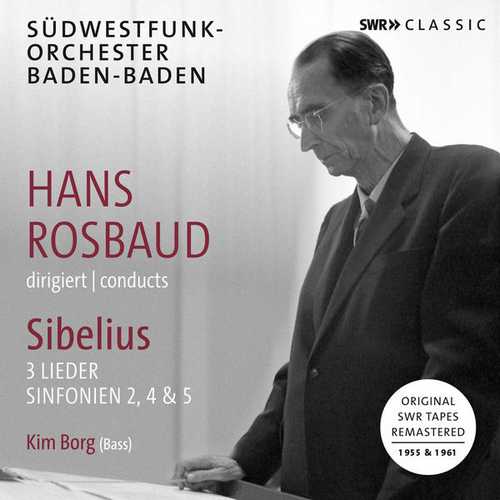
Composer: Jean Sibelius
Performer: Kim Borg
Orchestra: Südwestfunkorchester Baden-Baden
Conductor: Hans Rosbaud
Number of Discs: 2
Format: FLAC (tracks)
Label: SWR Music
Catalogue: SWR19105CD
Release: 2021
Size: 1.12 GB
Recovery: +3%
Scan: yes
CD 01
01. Kom nu hit, Död, Op. 60 No. 1 (Bertel Gripenberg after Shakespeare)
02. Demanten på marssnön, Op. 36 No. 6 (Wecksell)
03. Til kvällen, Op. 17 No. 6
Symphony No. 2 in D major, Op. 43
04. I. Allegretto
05. II. Tempo andante, ma rubato
06. III. Vivacissimo
07. IV. Finale. Allegro moderato
CD 02
Symphony No. 4 in A minor, Op. 63
01. I. Tempo molto moderato, quasi adagio
02. II. Allegro molto vivace
03. III. Il tempo largo
04. IV. Allegro
Symphony No. 5 in E flat major, Op. 82
05. I. Tempo molto moderato – Allegro moderato
06. II. Andante mosso, quasi allegretto
07. III. Allegro molto
Rosbaud is not generally recognised as a conductor of Sibelius’ works to the extent that he is as an interpreter of the music of Mozart, Mahler, Strauss or the radical modern music of the 1950s. Music enthusiasts with high expectations, however, got to know him as a result of the well-received 1954 recording he made for Deutsche Grammophon of some of the Finnish composer’s shorter orchestral works. Rosbaud combined a meticulous approach, unmistakable intuition, extensive experience with complex genres and extraordinary liveliness. His studio recordings from 1955 and 1961 of three Sibelius symphonies and three songs for voice and orchestra clearly demonstrate his optimum artistic approach to the music of the great Finnish master.
A modest event in the world of reissues. As part of their vast and fascinating edition dedicated to Hans Rosbaud (1895-1962), the SWR radio team unveil completely new interpretations of two symphonies by Jean Sibelius (2nd, 4th), a composer that the Austrian conductor, who in the 1950s was an ardent defender of even the most brutal modernism at the Donaueschingen Festival and who was one of Pierre Boulez’s mentors, has never shied away from conducting.
In 1955 Deutsche Grammophon embarked on a series of recordings to celebrate the Finnish composer’s ninetieth birthday, releasing an entire LP of Sibelius’ works with Hans Rosbaud conducting the Berliner Philharmoniker. Leading it, a strange Tapiola, modern, princely and surprising, not to be missed.
In Baden-Baden, Hans Rosbaud was also celebrating the composer with his Sudwestfunkorchester, and on two evenings, the 6th and 7th of December 1955, on the eve of Sibelius’ birthday (8th December), he conducted the great Finnish bass Kim Borg in three songs, and the Fifth Symphony. In January of the same year, on the 7th January 1955, he had taken the defence of the Second Symphony. In January 1961, he returned to Sibelius with the extraordinary Fourth. Hans Rosbaud is particularly sensitive to the architecture of the works, always choosing a tempo that is appropriate and fluid. In this respect, the Second Symphony may surprise you by the very moderate tempo of its opening movement, and yet what a beautiful momentum towards the final coda. The Fourth offered here by the SWR is unforgettable, as Rosbaud unveils such extraordinary intervals. The tempo is restrained, and the atmosphere perfectly desolate without being demonstrative until it becomes quite “soaring” in Il tempo largo, before it turns into the truly cataclysmic finale (Allegro). With great aptness and naturalness, Rosbaud lets us hear all the rough timbre combinations (woodwinds and brass), a rare quality indeed. This 4th will fascinate those who remember Herbert von Karajan (1965) conducting this work, as you will probably hear an affinity in the musical visions.
Some days before the Parisian audiences welcomed the great Finnish conductor Tauno Hannikainen for a concert at the head of the R.T.F. Orchestra, Hans Rosbaud conducted the Fifth at Baden-Baden. Here again, the Austrian conductor distinguished himself by his attention to orchestral detail—the string phrasing in the Allegro molto—and by his continuous search for Sibelius’ tonal singularity, unparalleled in the landscape of European musical modernism.